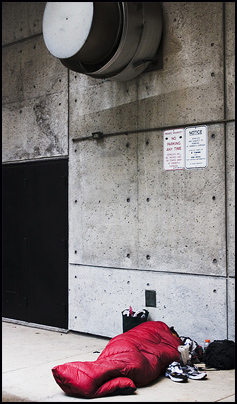
In Florida, at any given time, there are 10 or 12 homeless encampments in the general area of Tampa. The estimated 2,200 inhabitants include an estimated 170 veterans. Reporter Kevin Brady quotes Thomas Brown, who is an outreach coordinator for the organization Tampa Crossroads:
There’s a perception out there that homeless veterans are all drug addicts and alcoholics but that is not the way it is.
Brady also quotes a vet known as Ray, who returned from overseas to find that his second marriage had crumbled and he couldn’t get a job. Here is the part that pertains to suicide:
I volunteered for my second deployment for one reason: to die.
The InterAgency Council on Homelessness says there are more than 62,000 homeless veterans in the country. Depending on whose numbers you accept, between 13% and 25% of people experiencing homelessness in the America are veterans.
Whatever the percentage is now, the Veterans’ Affairs Office foresees that it will rise in the next four years, to where half the homeless will be vets. Among all known suicides, the VA guesses that about 22% of them are veterans. A lot of people are working on solutions to both the homelessness and the suicide rate.
Teresa Shumaker of the Mendocino Beacon interviewed the author of The Warrior’s Mantra, a book whose audience includes emergency services personnel. Roger Ruge is a former law enforcement officer who became a crisis intervention counselor. His method of teaching people to condition their minds and avoid post-traumatic stress involves positive affirmations and mantras.
Shumaker obtained this quotation from Ruge, about veteran suicides:
There is the stigma associated with [seeking help]. There is also this distrust and really long waiting period… Plus, [they] have the warrior mindset. The warrior mindset is, ‘I can take of myself.’ They don’t want to admit that there is a problem, because that is admitting there is a weakness… You have this culture of people who don’t want to seek help in the first place, and then a system that is broken, overwhelmed and can’t really help them… When you are having acute symptoms, you need help right now which is why the suicide rate is so high.
National Survey of Homeless Veterans
Interested parties can download a PDF report compiled by the National Survey of Homeless Veterans. The latest numbers available to work with were from 2011, so there will probably be an updated report soon. The 100,000 Homes campaign added up information gathered by volunteers in 47 communities, from more than 23,000 people experiencing homelessness.
They found that veterans tend to be older and to have been homeless longer than civilians. They are more likely to be sick, and more likely to have traumatic brain injury. This organic physical damage is different from, and may co-exist with, PTSD, which is psychological trauma.
The report compared the situations of homeless veterans who are hooked up with the system, and those who are not. Whatever help people are receiving doesn’t seem to make much difference in regard to their health, except that fewer homeless veterans have Hepatitis C than the non-veterans. The report says:
The data […] suggest that VA health benefits alone do not improve the health outcomes in question for veterans, nor do they help veterans escape homelessness more quickly.
Interestingly, there was no significant difference in length of time homeless between these two groups. Neither was there any significant difference in the health, jail, prison or other data…
Strangely, the report doesn’t contain the word “suicide.”
Reactions?
Source: “Missing In America – Homeless Veterans,” The Current, 05/30/13
Source: “Retired officer shares his knowledge on homelessness…,” The Mendocino Beacon, 05/23/13
Source: “National Survey of Homeless Veterans, ” 100khomes.org
Image by fullyreclined (don toye).



